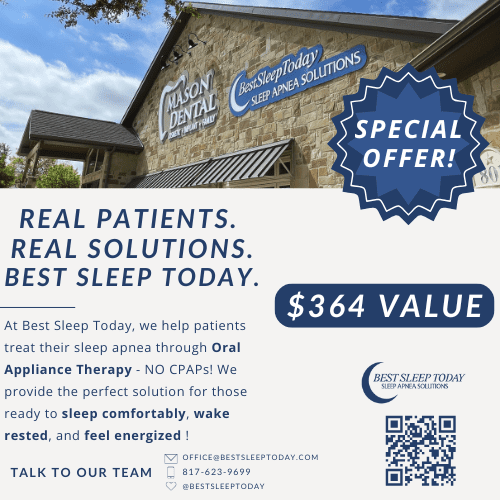
Studies, Research, and Resources
Below is a running list of research and resources for Best Sleep Today:
A-Fibrillation
Obstructive Sleep Apnea and atrial fibrillation have been linked thanks to the many risk factors that they share like high blood pressure, obesity, heavy alcohol use, or hyperthyroidism. AFib is a type of arrhythmia that causes the heart to beat quickly and out of sync, often resulting in poor blood flow. Studies show that your risk for developing AFib with sleep apnea may increase by up to 90%.
Acid Reflux
Acid reflux occurs when the lower esophageal sphincter remains open and gastric acid backflows in the esophagus. Research indicates that sleep disturbances caused by OSA may induce acid reflux, while untreated acid reflux impairs sleep. Studies show that your risk for developing acid reflux with untreated OSA may increase by 66%.
Anxiety/Depression
Studies show that excessive daytime sleepiness, one of the most common OSA symptoms, leads to mental health conditions like depression, severe anxiety, and even panic attacks. Healthy sleep is critical to your physical and mental health.
Chronic Night Time Grinding/Clenches
According to research, your body is more likely to clench or grind your teeth when struggling to open your airway. While research is still inconclusive on the severity of the relationship between grinding and OSA, treating sleep apnea can alleviate and manage teeth grinding.
Dementia
OSA has been linked to dementia, especially in older patients, via neuroimaging biomarkers. Some studies estimate the risk of developing dementia increases by up to 50% when sleep apnea goes untreated.
Frequent Night Time Urination
Obstructive Sleep Apnea repeatedly reduces airflow and oxygen levels that are linked to a drastic night time urination (up to 84%) thanks to an effect on the hormones that regulate urine production. Frequent sleep interruptions force the individual to become conscious of the urge to visit the bathroom.
Heart Disease
Heart disease is one of the biggest side effects of OSA. Studies have shown that the risk of heart failure increases by up to 140%, while the risk of coronary heart disease goes up by 30%.
High Blood Pressure
Individuals who suffer from OSA face an increased risk of cardiovascular issues, such as high blood pressure. For most people, blood pressure dips by 10-20% when asleep. For those who have sleep apnea, this isn’t the case. Those with OSA have been found to experience a heightened risk of high blood pressure by as much as 50%.
Obesity
Studies show that OSA may cause significant weight gain in individuals when compared to similar adults without sleep apnea. Sleep apnea depletes the body’s energy needed to maintain a healthy weight, helping to contribute to a significant increase in the risk of obesity.
Snoring
Snoring is one of the most common symptoms that shows in OSA patients. As the airway narrows and becomes obstructed, snoring, snorting, and/or gasping occurs. Not all snorers have sleep apnea, and not all sleep apnea patients snore, but the two go hand in hand. For those who suffer from OSA, snoring, snorting, and/or gasping for breath increases drastically throughout the night.
Stroke
Studies have shown that sleep apnea more than doubles the risk of stroke in middle-aged and older males, while it significantly increases the risk for women.
Type 2 Diabetes
When oxygen is deprived from the body, there is a negative effect on glucose levels and insulin resistance. The effect is an increased risk of developing Type 2 Diabetes.













